








I am delighted to present our annual report for 2022/2023. As a trust we are working hard to increase our accountability to our stakeholders in delivering on our mission to improve outcomes, transform lives and to enable social mobility. Most of our schools have continued to make rapid progress within a context that remains challenging. We are grateful for the work that you do in supporting our mission and in ensuring the success of our students.
For the coming three years we have launched an exciting new strategy that is focussed on building upon the progress that we have already made within our schools and on widening the impact that our schools have within the community. I must end by thanking our staff, our parents, our volunteers and our governors. Those of you that go the extra mile to support in parents’ associations or to make a strategic input to the work that our schools do. Thank you.

It is a pleasure to be able to share our second annual impact report with you. Our schools continue to make excellent progress. 2023 saw outcomes in schools that were at least comparable and, in most cases, considerably better than those prior to the pandemic in 2019. It is for this reason that we use 2019 as our benchmark for comparison. We are pleased with the progress that our schools are making against outcomes data but also against the Department for Education’s new benchmarks for strong trusts.

Of course, the context in which we work remains challenging. The progress of disadvantaged children has stalled nationally and despite several years of significant investment in the pupil premium, these pupils do not make the progress that we would hope to see nationally, or within our schools. Attendance was a huge concern for us at the beginning of this academic year. The resilience and mental health of our young people is impacting their ability to make good progress both nationally and within our schools.
Finally, the pressures on our workforce are well publicised. Industrial action, low retention rates; with over 40% of teachers leaving schools within the first 5 years of their career, and higher than normal absence rates, have all contributed to instability within the sector.
This year we have started a listening campaign to help us address the challenges of our new strategy. Our new three-year strategy addresses these priorities and sets an ambitious agenda for our schools.
Of course, to lift this from the paper on which it is published, we are acutely aware that we need to live our values and be the change that we want to see across our schools. The purpose of a trust or a group of schools is to ensure meaningful collaboration where it can make a difference to the outcomes of young people. Hopefully, you will gain from this report the extent to which this has taken off across our schools. I’m humbled by the work that my colleagues do but I also know that there is a long way to go.








8 GOOD
SCOTTS PARK PRIMARY (2022) RAVENSWORTH PRIMARY (2018) BLENHEIM PRIMARY (2019) THE RAVENSBOURNE (2024)
COOPERS (2023) SPIRES (2023) EDEN PARK HIGH (2021) MEAD ROAD INFANT (2023)
MEMBERS

WHY DO WE EXIST?
To improve outcomes and transform lives and enable social mobility.
HOW DO WE BEHAVE?
Trust Kindness
Endeavour
WHAT DO WE DO?
We create welcoming and open schools for the local community, where every person belongs, thrives, makes excellent progress and succeeds.
HOW DO WE SUCCEED?
Through aligned autonomy, a clear backbone, strong culture, academic rigour and smart systems

% CHILDREN WITH A GOOD LEVEL OF DEVELOPMENT
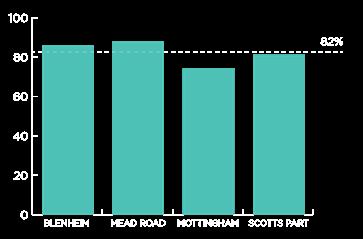
% CHILDREN AT EXPECTED LEVEL ACROSS ALL EARLY LEARNING GOALS

AVERAGE NUMBER OF EARLY LEARNING GOALS AT EXPECTED LEVEL PER CHILD


% EXPECTED STANDARD+ READING, WRITING & MATHS
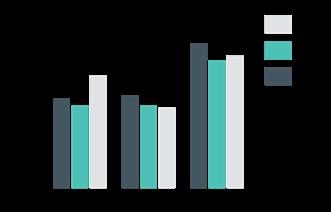
% EXPECTED STANDARD+ READING
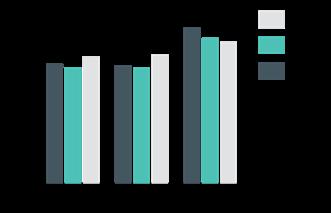


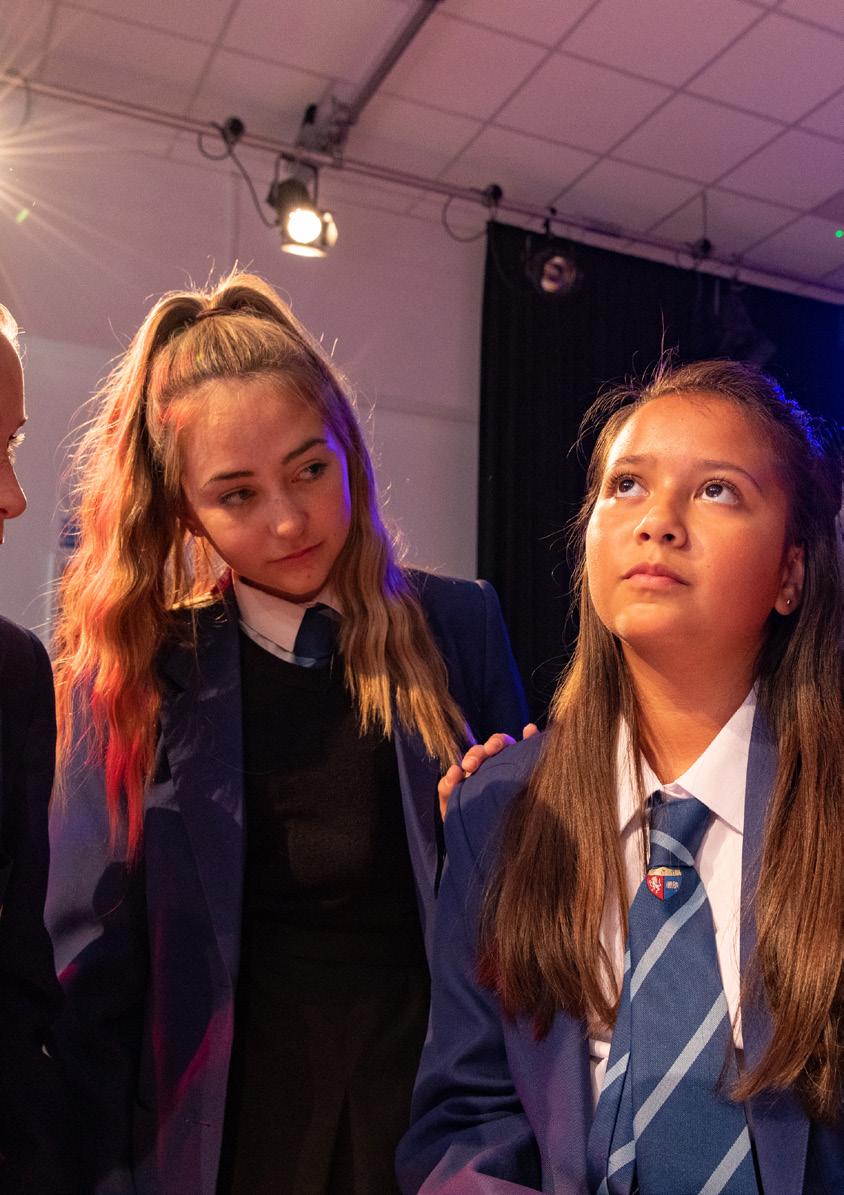
% GRADE 4+ ENGLISH & MATHS
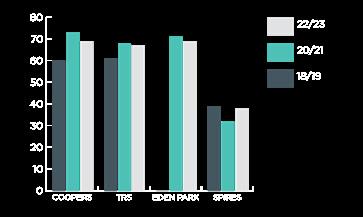
% GRADE 5+ ENGLISH & MATHS
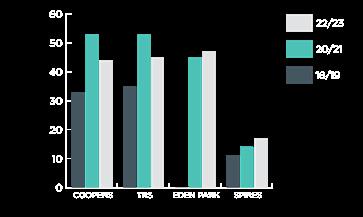
% GRADE 4+ AND 5+ ENGLISH & MATHS
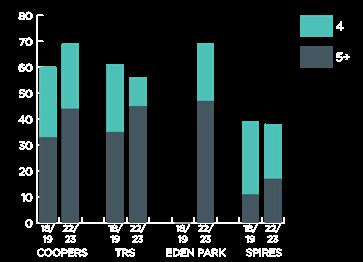
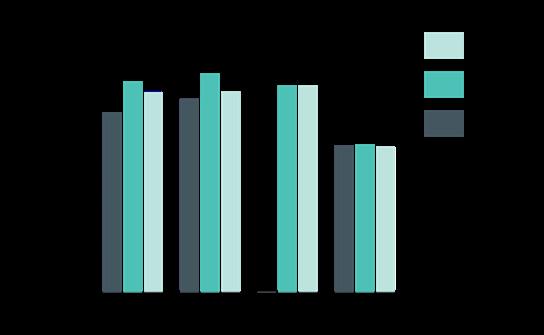

 A8 AVERAGE SCORE
A8 AVERAGE SCORE
The Attainment 8 score is calculated from the sum of 4 elements (or “buckets”) for each pupil:
• English – double weighted – best of English Language or Literature
• Maths – double weighted
• EBacc3 – three highest point scores from any of the EBacc qualifications in science subjects, computer science, history, geography, and languages.
• Other3 / Open3 – the three highest point scores in any three other subjects.
For each KS2 average prior attainment the national average Attainment 8 score is calculated. The Progress 8 score for a pupil is the difference between their score and the national average.
The Progress 8 score for a school is the average of the pupil scores. It is important to emphasise that Progress 8 is a relative measure, calculated each year on the basis of the actual results of all of the pupils taking exams at the end of Key Stage 4 that year.

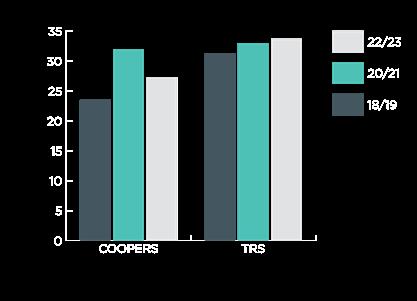

PRIMARY
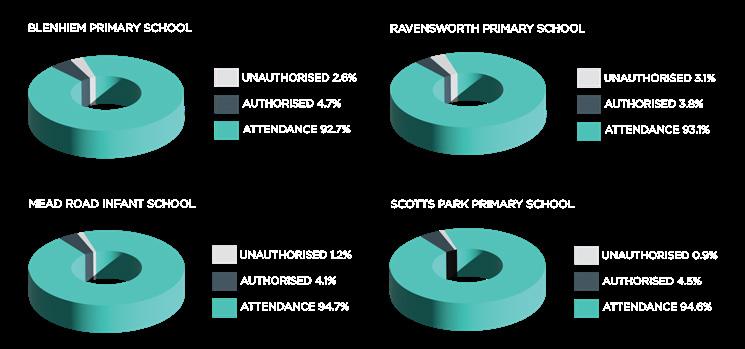
SECONDARY
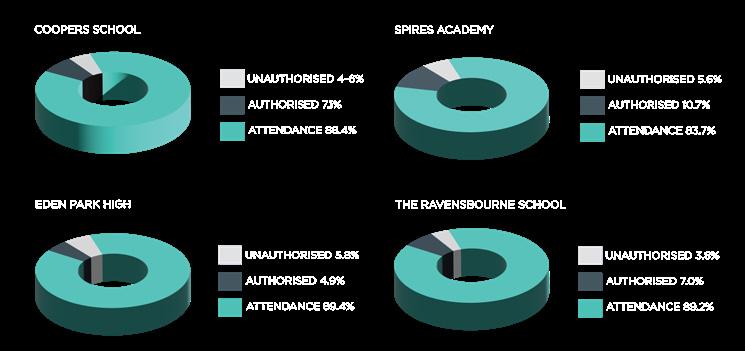
In 2022/2023 we set about reviewing the work that we have undertaken to develop the curriculum across our schools. This work started in 2020/2021 and it has come a long way. We do this within the framework set by our curriculum principles.
In the primary curriculum we launched a new maths curriculum across our schools. Schools also embedded Read, Write Inc, Recipe for Writing, Reading Masters and Grammar Masters across the schools. The feedback on all have been positive. Our purpose is to create greater consistency and to reduce teacher workload.
In the secondary curriculum we extended the work that we have done to develop Big Ideas across all subjects. These are the threads that tie our curriculum together and make it consistent. Ofsted reports have highlighted this work as high quality, and it provides all subject leaders with clear intent within their areas. In all subjects we now have progression maps and clear standards that students should achieve each year.
In the EBACC Subjects (English, Maths, Science, Computing MFL, History and Spanish) our leaders have been meticulous about their approach to planning as they begin to develop more detailed medium term and short-term plans. These provide our teachers with clear exemplars that they can use if they choose. They are not a straitjacket; they are a framework, and they ensure greater consistency across our schools.
This year we also launched our Post 16 Strategy. This strategy ensures greater consistency across the schools and a minimum entitlement to our students.
Every child is supported to access a full curriculum.
IMPROVING OUTCOMES
TRANSFORMING LIVES
Five year plans are carefully spiralled using spaced learning.
Powerful knowledge is explicitly highlighted through Knowledge Organisers.
Schemata (Big Ideas) are used to link new content to previous learning.

This Year we have introduced a brand-new model of assessment within the primary schools. Renaissance assessment is now supporting teachers to give feedback to pupils that help to move their learning forward.
In secondary schools we had the first full year of our new Key Stage 3 assessment model. This has been well received. This model was supported by common assessment in the core in Year 7 and 8 across all the secondary schools. Not only does this model increase the accuracy of assessment but it also supports the workload of our staff.
Changes to assessment at Key Stage three were made in direct response to comments from parents about the suitability of a single ragged judgement. Our end of year reports now benchmark your child’s progress against that of their peers. We have aligned assessments across core subjects to support this, offering further accuracy.

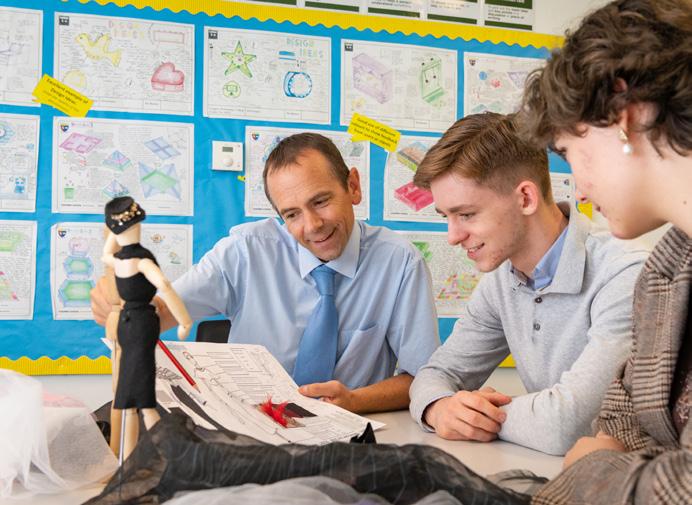
Careers Education, Information, Advice and Guidance (CEIAG) is developing at pace across the schools. Natalie McIntosh, Associate Assistant Headteacher from Eden Park leads the Careers Strategy and meets regularly with each CEIAG lead in each school. We now have a coordinated approach to Work Experience, Unifrog online CEIAG platform, Destinations, Policies, school CEAIG Websites and an online platform for sharing resources. We also use Compass data to create bespoke action plans for each school. We have the goal for all schools to meet all 8 Gatsby Benchmarks by the end of the academic year.


In 2022/2023 we launched a new project across all our schools called cradle to career. You can find more about this partnership here Our Cradle-to-Career Partnership | Reach Foundation (www.reach-c2c.org).
This project encourages us to think of the journey that young people make in our schools from the moment they arrive to when they leave.
At the beginning of this process, we have started to collect the destination data across all of our schools and we look forward to furthering our impact in ensuring all of our young people leave ready for the next stage of education and life.

KEY STAGE 4 DESTINATIONS

KEY STAGE 5 DESTINATIONS

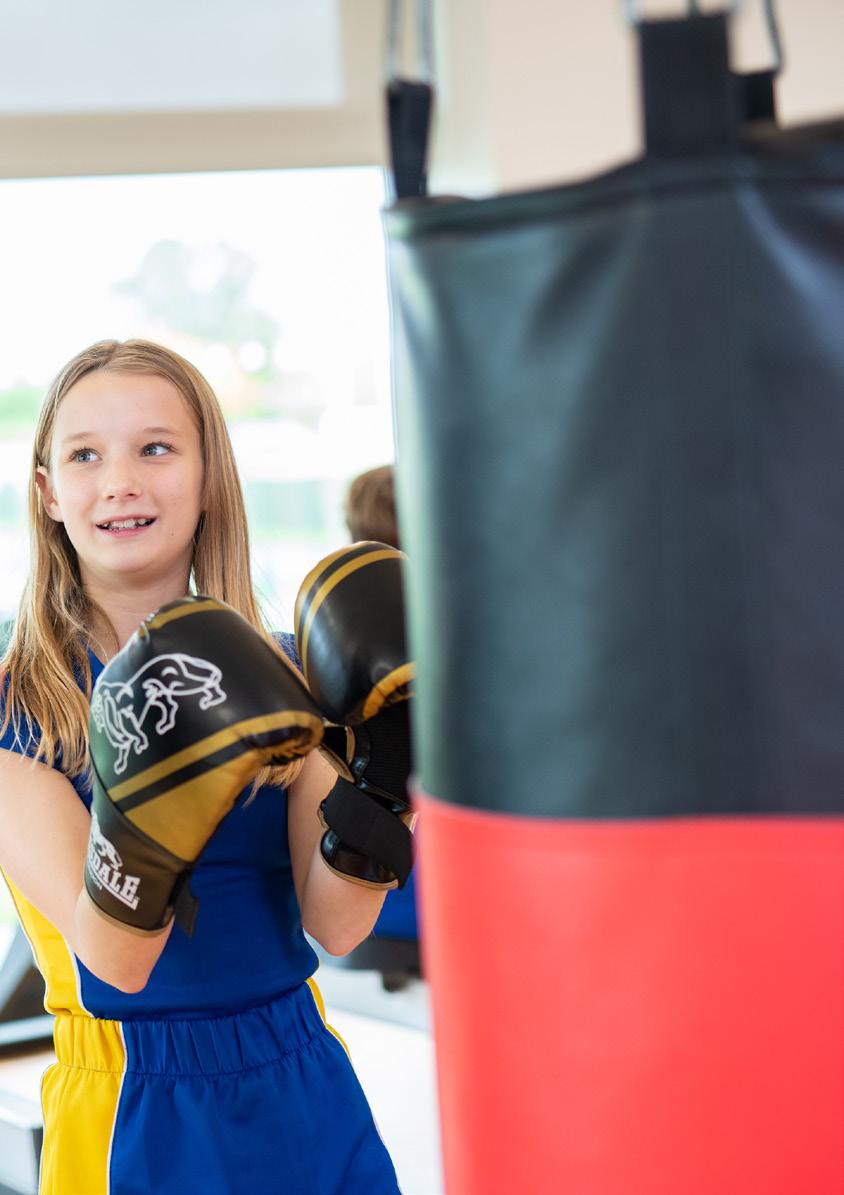
We believe education should prepare students not just for exams, but for the dynamic and ever-evolving world they will inherit. We are committed to equipping students with the skills and knowledge to thrive in this complex landscape. Our approach includes:
Revitalizing PSHEE (Personal, Social, Health and Economic Education)
We recognise the critical role PSHEE plays in developing well-rounded individuals. We are actively collaborating with our schools to refine our PSHEE curriculum, ensuring greater consistency and comprehensiveness across all schools.
Enrichment for All:
We believe every student deserves the opportunity to explore their passions and discover hidden talents and we are dedicated to supporting our schools in developing rich and diverse enrichment programmes. These programmes go beyond traditional academics, offering activities in areas like coding, robotics, creative writing, entrepreneurship, and the arts. We are working closely to ensure inclusivity, making these programmes accessible and engaging for all students regardless of background or ability.
Cultivating Community Engagement:
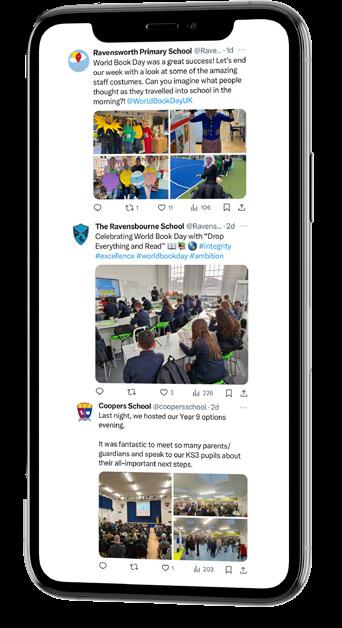
We foster a strong sense of community spirit within our schools. Schools are empowered to select charities and causes that resonate with their student body and local environment. Through volunteer opportunities and service projects, students gain valuable life skills but also develop a deeper connection to the communities they serve. This fosters a sense of responsibility and encourages students to become active and engaged citizens.

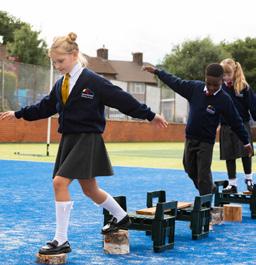

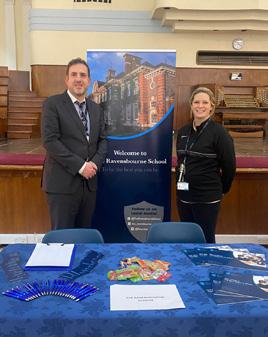

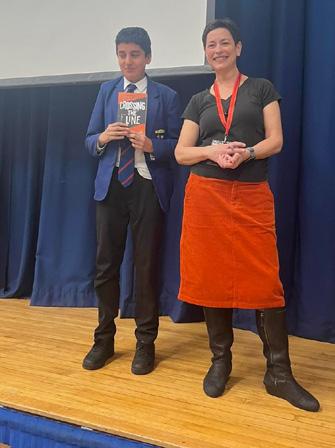

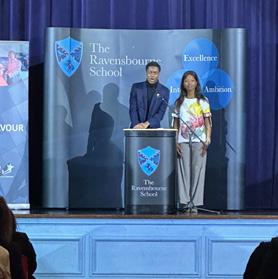

E21C aims to deliver service excellence in operations. We have developed an “operating model” for each of our central services which sets out clear expectations for the activities of our central team and schools. We seek feedback from schools regularly on 10 different functions. By evaluating how well we are delivering these activities and processes, we understand where we are now and agree how we will improve our service to schools. This encompasses both in house services and outsourced contracts (Catering, Cleaning, IT support).
We are also aiming to consolidate and simplify the systems we use. By Easter 2024, we will have in place the MIS (Arbor), HR (Civica) and Finance systems (Sage Intacct, IMP) that we will use. The next step is to integrate these with other systems where possible, in order to minimise workload.
The Trust made a £638,000 revenue surplus in 22/23 which was partially offset by a planned capital deficit of £316,000. This resulted in an overall surplus of £322,000 for the year (excluding the pension reserve)1
As a consequence of the 22/23 surplus, the Trust’s unrestricted reserves increased from 4.05% of total annual income at the end of 21/22 to 5.06% in 22/23. This increased level provides the Trust with more security going forward and is in line with the minimum reserves per our reserve policy and that of most other academy trusts. The Trust used the reserves to generate £112,000 additional income through low-risk deposits.
1The pension reserve commonly removed from the presentation due to material changes in the actuarial assumptions year on year.
The finance department have made a number of innovations during the year including system changes and increased automation. Each improvement is assessed against our Strategic Anchors to ensure that it helps our staff do their jobs more efficiently and effectively and ultimately provides us with more money to put back into the classroom.
An advantage of belonging to a multi academy trust is the School Condition Allocation (SCA) funding we receive. The money that we are allocated is for capital expenditure and can be used on:
Structural defects, hot water issues, suitable fire alarm systems, fire compartmentation issues
Leaking roofs, replacement of 30-year-old flat roofs
Replacement of heating systems
Installation of LED lighting and solar panels
Building condition surveys were carried in the Spring of 2023, these reports support us in creating a robust 5-year strategic estates management plan. We use a construction consultant specialist who then advise us on where and how to spend the money across the estate. This is prioritised on need and for the period 2023/24 the trust invested over £2.3m as follows.
This investment covers significant roofing schemes, LED lighting install, upgrading drainage systems, asbestos removal, major electrical rewiring work, fire safety improvements, and a wide range of minor works across all schools

Following the launch of the people strategy in 2022, this year we started to deliver on the plans. We have introduced talent management using career conversations to understand the aspirations of our people so that they all have a relevant development plan. Instructional coaching remains a key element of our CPD for teachers and we have developed career pathways for our associate staff. We have also launched our wellbeing strategy which includes a focus on mental health for staff and a new policy on menopause.
Employee net promotor score (eNPS): 40.8 which indicates that there are more promoters than detractors in E21C, which is generally a good sign. However, a score of 50 or higher is considered an excellent eNPS score, so there is still room for improvement. Turnover was at 26% across the Trust, we have supplemented exit questionnaires with interviews to understand reasons for leaving.
Employee absence: Total number of working days lost 5587 c. 5% We are implementing our absence management policy with greater rigour and supporting staff through occupational health referrals to return to work with adjustments in place.
• Instructional Coaching for all Teachers
• Set up a coaching hub for Steplab with 100% engagement across
• Set up a teaching institute
• Develop a Leadership Charter
• Roll out and embed approach to talent management
• Launch associate staff career pathways and development
• Golden thread – Leadership development – NIOT partnership (ITT, ECT and NPQ for leaders)
• Start with the why; overcommunicate the 4 critical questions
• Implement the wellbeing strategy
• Regular CEO & Leadership meetings with staff
• Harnessing Edurio staff survey results to drive cultural
• change and address issues
• Comprehensive wellbeing app and Employee Assistance Programme (EAP)
• Face to face exit interviews offered to staff who are leaving
• Ensuring adequate number Mental Health First Aiders
• Review of wellbeing initiatives
• Annual staff conference
• Implement an applicant tracking system to improve candidate attraction and create administrative efficiencies
the recruitment strategy and
• E21C presence at recruitment fairs
• Annual induction event
• Continually promote
• Twice yearly review of staff for each school with
• Annual HR Audit in each school by HR
• Improve the current payroll process
• HR system (Civica) to sync with Management Information System (Arbor)
In the last year we have been building momentum with our sustainability work. Harnessing funds from the Department for Education, we spent £452k on LED lighting in 6 Bromley schools, which will reduce the electricity used. Eden Park was built with 100% LED lighting, and Spires Academy will be converted in the summer of 2025. At Easter 2024 we will be surveying the roofs on our schools to establish the feasibility of installing solar panels. We are keen to convert gas boilers into Air Source Heat Pumps, but the finances required, even with a government matching scheme, are too great at this point in time. We will review this annually so we can invest at the right time, as costs reduce.
We have shared campaign posters with all our schools to help staff and students remember to switch off lights, computers, and equipment when not in use.
The Department for Education is requiring all schools to have a climate action plan by 2025. At E21C, our schools are creating their own sustainability action plan in 23-24. Our associate staff spent time at our conference in October talking about what they would like to see happening to drive sustainability in schools. All these ideas have been shared to support our school leadership teams. We have already implemented “Meat Free Mondays” and by the end of the year all schools will have a student Eco-Council. We are supporting schools to recycle by going out to tender on waste contracts; this will be in place in the summer of 2024. We are in the process of implementing an electric vehicle car scheme for staff.
Following the launch of of DEI work at the staff conference in October 2022, we continue to work on this important area, aiming to “Develop our consciousness, confidence and competence in DEI.” The table below sets out our progress by principle:
Creating inclusive workplaces Trust conference in October 2022 focussed on Belonging, Schools committed to maintaining the focus on DEI throughout the year, through work of DEI leads. School took different approaches to this.
Creating belonging for all Trust conference in October 2022 focussed on Belonging, with keynote speakers who shared their experience and perspective of not belonging and the impact that this has on individuals
Building representation in the curriculum
Created a DEI framework for reviewing subject curricula Secondary schools focus on developing the curriculum and resources for Personal Development (PSHE)
Ensuring that policies, processes, practices are inclusive and equitable
In spring term 2024 we are creating a selfevaluation rubric for schools and updating the Equality Objectives and Accessibility plan for each school.
Recruiting, developing & retaining diverse talent
Committing to CPD for staff
Created a policy and practice considerations document (looking at the 9 protected characteristics) to support the review of policies at trust and school level.
We will review our approach to this in the summer term of 2024.
CPD started with the staff conference and continued with recorded online training by Hannah Wilson. Individual schools have also commissioned sessions from external organisations such as The Prosperity Project.
We held training for DEI leads in January 2024 on Allyship and challenging inappropriate conversations, which will be delivered in schools.
Listening to stakeholder views
Using data to inform the strategy
We do this through the Edurio staff, pupil and parent surveys.
We collated data on staff and pupils for the first time in May 2023 and this will be an annual process. We have also engaged our trustees and governors in late 2023 and will be able to build this into our data review in summer 2024.
If you would like to get involved, and volunteer in one of our schools, or work with us, please visit our websites listed below:
@Education21C
@Educationforthe21stCentury
@Education21C
@Educationforthe21stCentury
E21C Website e21c.co.uk
Work with us e21c.co.uk/Careers/Current-Vacancies
News and Events page e21c.co.uk/News
Contact us e21c.co.uk/Contact
Senior Schools
Eden Park - edenparkhigh.com
Coopers - coopersschool.com
The Ravensbourne School - ravensbourne.info
Spres Academy - spiresacademy.com
Primary Schools
Blenheim Primary School - blenheimprimary.com
Scotts Park - scottsparkprimaryschool.co.uk
Ravensworth Primary School - ravensworthprimary.co.uk
Mead Road Infant School - meadroadinfantschool.co.uk






